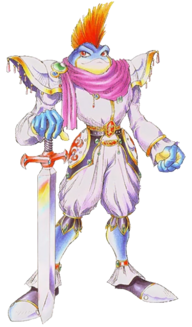- Joined
- Dec 9, 2024
- Messages
- 137
- Level up in
- 113 posts
- Reaction score
- 344
- Points
- 827
If you were to step through the gates of RPG history and ask which title could ignite a lifelong passion for the genre, Breath of Fire by Capcom would undoubtedly be among the most glowing answers. Released in 1993, and lovingly revisited ever since, Breath of Fire is not just a classic — it's an emotional cornerstone. It’s a game that reminds you what it feels like to dream with a controller in your hands.
From the moment you awaken as Ryu — a young warrior of a nearly forgotten race of dragonkin — you are thrown into a sweeping world painted with wonder, mystery, and heartache. Breath of Fire doesn't lazily hand you its lore; it unfolds it slowly, whispering ancient tragedies and heroic hopes in your ear with every new city, every whispered myth, every crumbling temple.
The world's different races, from the winged Wing Clan to the stubborn mole-like Mole People, feel real because they are steeped in distinct cultures, values, and burdens. Capcom didn’t just create a backdrop — they crafted an ecosystem of beliefs, histories, and destinies that makes the world feel ancient, lived-in, and heartbreakingly fragile.
Each party member in Breath of Fire is a gem polished by personal struggles and triumphs. From Nina, the Wing Clan princess bound by duty and longing, to Bo, the ranger with a tragic past, each character feels more like a companion than a pawn. Their development isn’t delivered through heavy exposition, but through their actions, sacrifices, and the unspoken camaraderie that grows as you travel the worn paths of their world. You don't just level up their stats — you level up your relationship with them. Ryu’s transformations into different dragons later in the game mirror his internal growth: from confusion and fear to acceptance and strength.
At first glance, Breath of Fire presents classic JRPG mechanics: turn-based battles, world maps, and town-to-dungeon loops. But under its traditional skin lies a surprising strategic richness. Each character has unique abilities outside of combat — hunting, fishing, flying — encouraging you to engage with the world more dynamically.
Even today, the balance between exploration, puzzle-solving, and combat feels tight and rewarding. The game's simple yet smart systems make it the perfect "first RPG" for anyone new to the genre, without ever feeling like it talks down to veterans.
In its 16-bit glory, Breath of Fire carries an artistic sincerity that modern hyper-realistic games often miss. Its colorful, expressive sprites breathe emotion. Its overworld is vast yet inviting. Its battle animations are surprisingly dynamic for the era.
The soundtrack — with its melancholic town themes and soaring battle music — lives in your heart long after the credits roll. Few games can so thoroughly etch a sense of place and feeling through just a handful of pixels and notes.
And just as fans’ nostalgia for Breath of Fire reaches new heights, Capcom has given us a beautiful treat: Breath of Fire IV has been made available on PC through GOG, bringing one of the most beloved entries in the franchise to a modern audience. For those who haven’t experienced it yet or for returning players, it’s a perfect chance to dive back into the world of Ryu and his companions.
Breath of Fire IV is widely regarded as one of the most refined games in the series, balancing a deep storyline with innovative gameplay mechanics. The lush visuals and haunting soundtrack are just as stunning today as they were when originally released. With this release on PC, Capcom has allowed a whole new generation of gamers to discover what made this game so special.
As we celebrate this revival, there's a growing sense of hope among fans that this is just the beginning. Breath of Fire's rich world, characters, and lore are ripe for expansion. There’s a growing expectation that Capcom might be gearing up to bring more of this iconic series to modern platforms, perhaps even with new entries or remakes. Fans can’t help but dream of Breath of Fire VI, or even the long-desired remaster of the original Breath of Fire.
For many, the hope is that Capcom sees the value in these nostalgic experiences, understands the demand, and reinvigorates the franchise with fresh stories, fresh dragons, and — who knows? — maybe even new forms of transformation.
Breath of Fire is not merely a nostalgic gem — it is an essential pilgrimage for anyone who loves RPGs or wishes to understand why the genre holds such power over the imagination. It is the purest kind of magic: a world that calls to you across time, whispering that the adventure never truly ends.



 MERRY CHRISTMAS
MERRY CHRISTMAS 